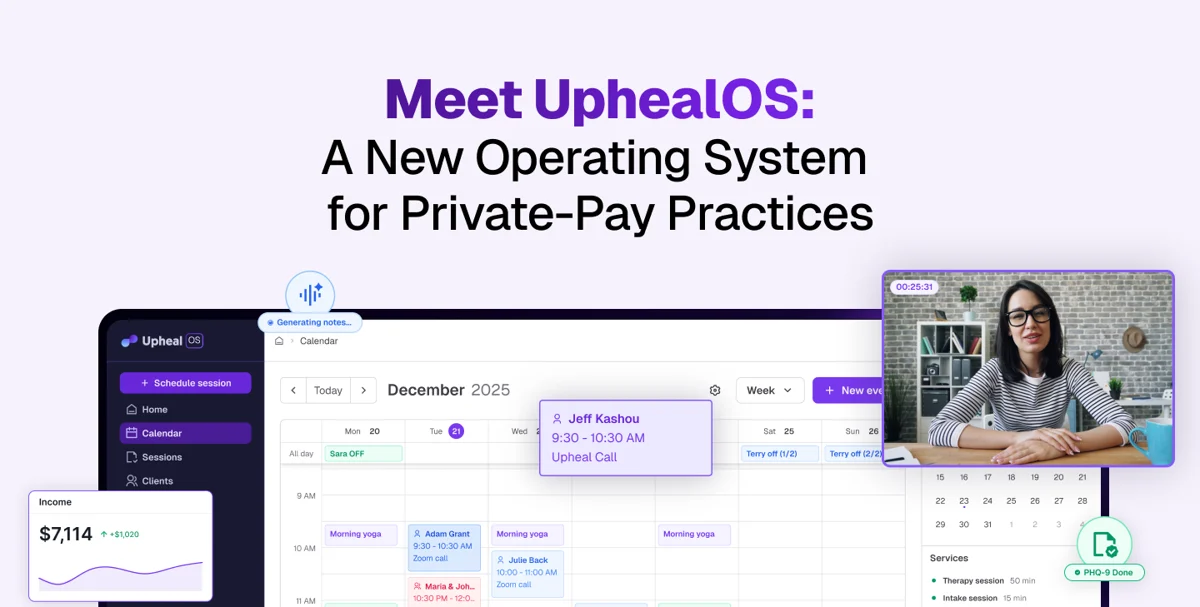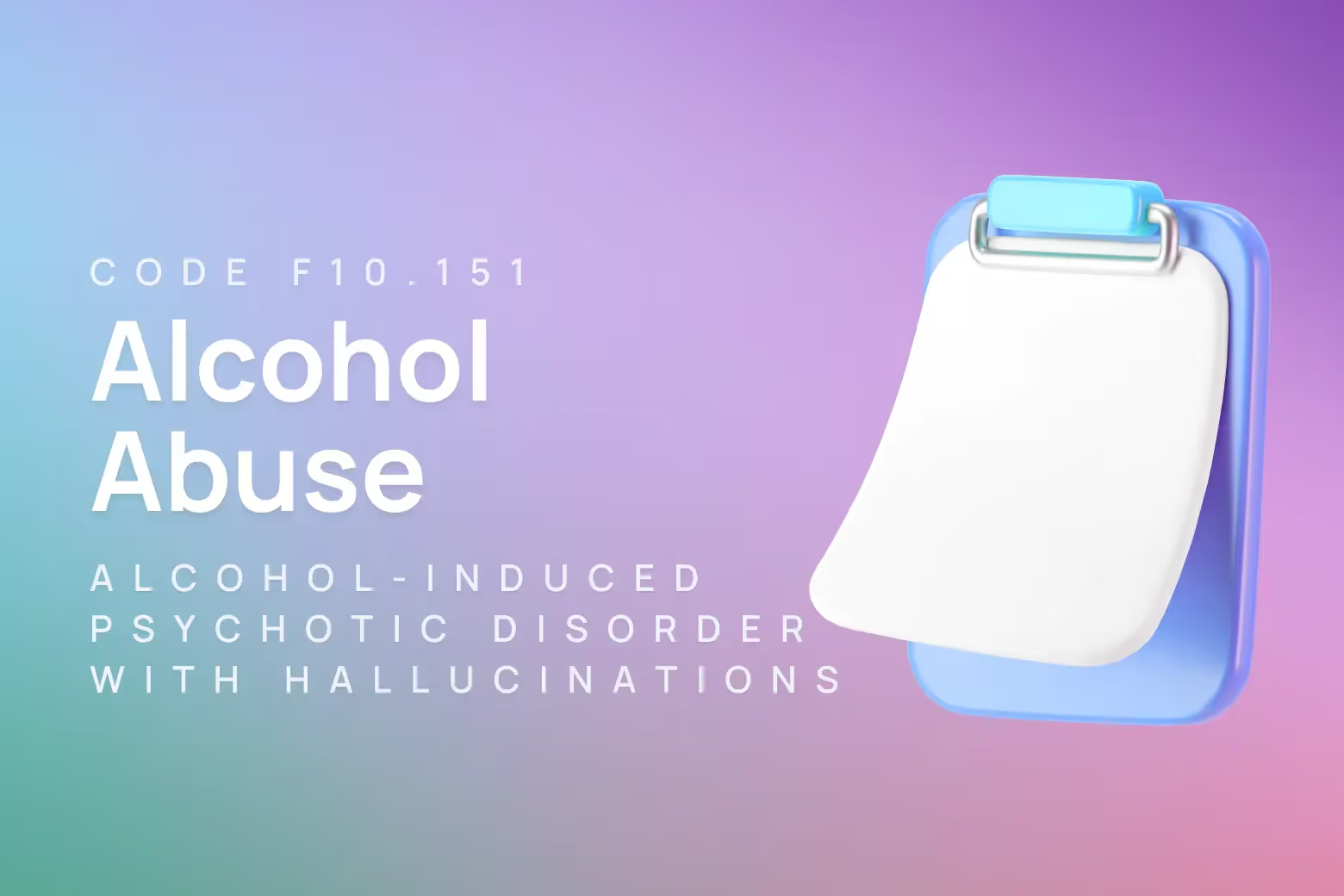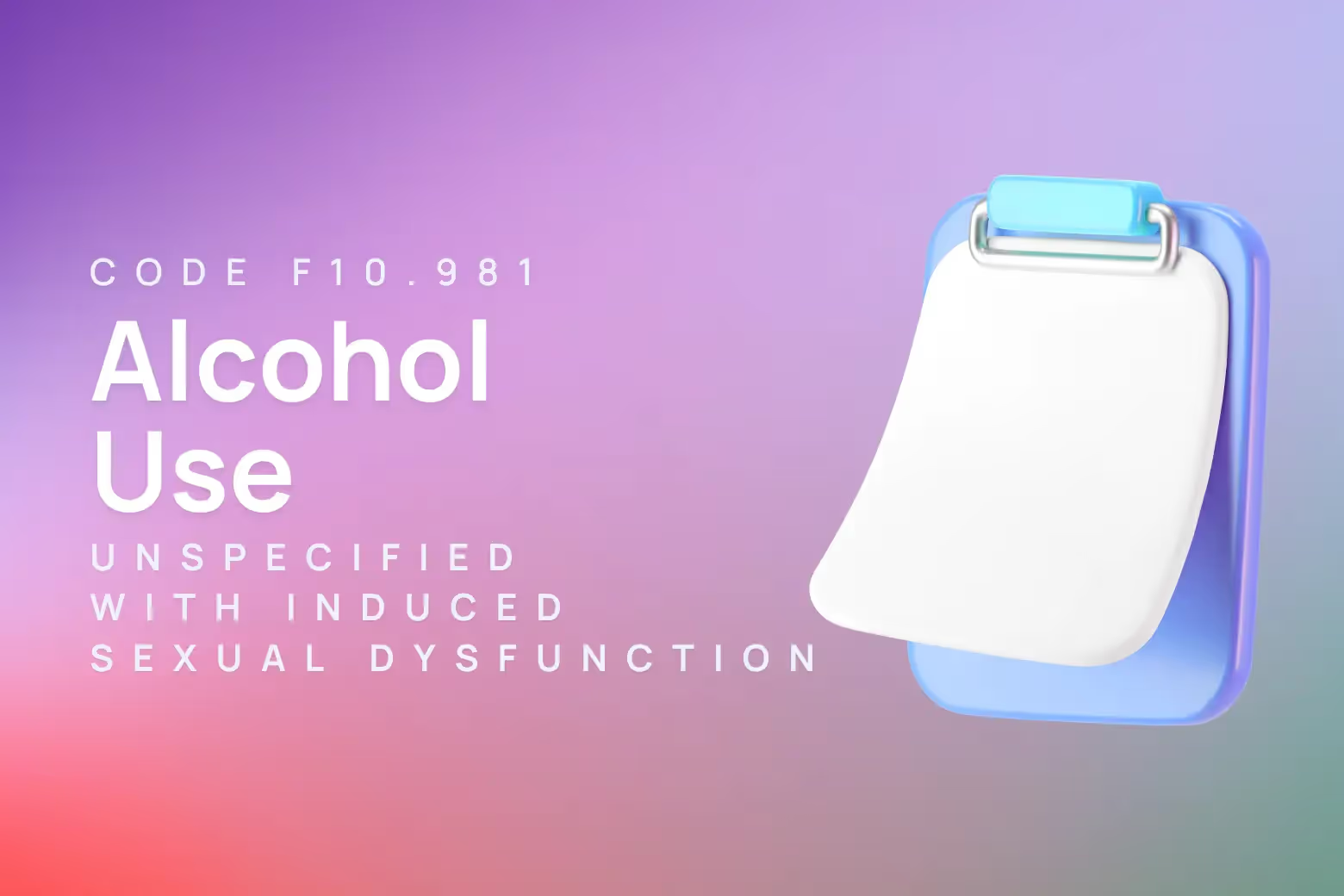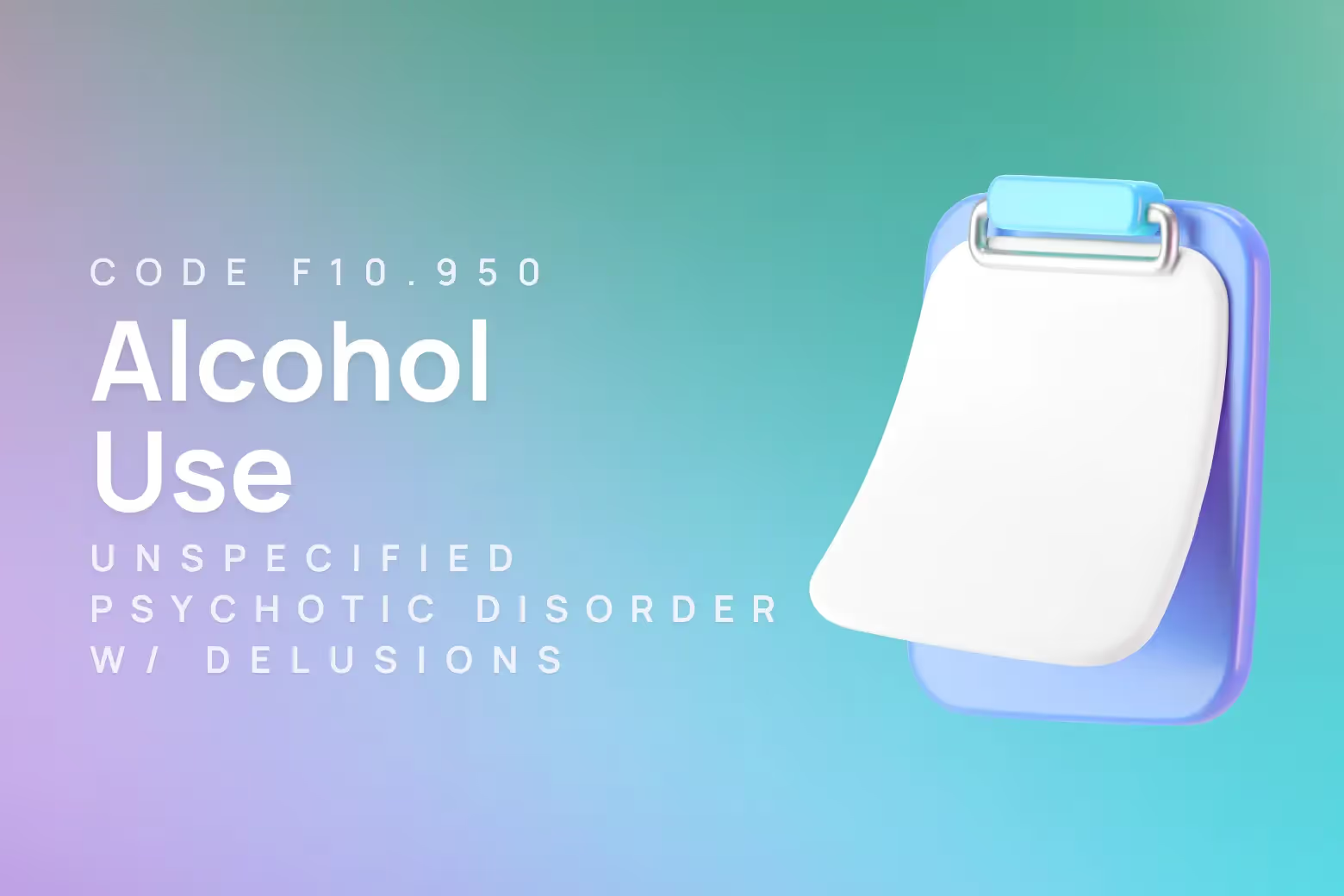ICD-10 code for alcohol use, unspecified with other alcohol-induced disorder

F10.988 is the ICD-10 code for alcohol use, unspecified with other alcohol-induced disorder.
This code represents problematic alcohol consumption that has resulted in clinically significant mental health complications beyond the primary substance use pattern.
The "unspecified" designation indicates that the alcohol use disorder severity cannot be clearly determined as mild, moderate, or severe.
Proper documentation of F10.988 ensures appropriate treatment planning while meeting insurance requirements for comprehensive alcohol-related care.
Key features:
- Used when alcohol use has caused additional mental health complications
- Encompasses various alcohol-induced disorders including anxiety, sleep, and sexual dysfunction
- Fourth character "8" indicates unspecified severity of underlying alcohol use disorder
- Requires evidence of clinically significant alcohol-related mental health symptoms

Diagnostic criteria for alcohol use disorder with other alcohol-induced disorder (F10.988)
F10.988 requires evidence of problematic alcohol consumption that meets criteria for alcohol use disorder, combined with clinically significant mental health symptoms directly caused by alcohol use.
The underlying alcohol use disorder involves a pattern of alcohol consumption leading to significant life impairment.
Key diagnostic indicators include:
- consuming alcohol in larger amounts than intended
- persistent unsuccessful efforts to reduce drinking
- continued use despite knowledge of alcohol-related problems
Additional criteria encompass spending considerable time obtaining or recovering from alcohol use, experiencing cravings or strong urges to drink, and failing to fulfill major role obligations due to alcohol consumption.
Physical symptoms may include tolerance requiring increased amounts for desired effects and withdrawal symptoms when alcohol use ceases.
The "other alcohol-induced disorder" component requires demonstrating that alcohol use has directly caused additional mental health complications beyond the primary substance use pattern.
These complications must represent clinically significant distress or functional impairment that warrants specific clinical attention.
When to use F10.988 diagnosis code
F10.988 applies when alcohol use has resulted in additional mental health complications but the severity of the underlying alcohol use disorder cannot be clearly specified. This code bridges the gap between substance use and co-occurring mental health symptoms.
F10.988 vs F10.980 (Alcohol use, unspecified with alcohol-induced anxiety disorder)
F10.980 specifically identifies anxiety symptoms directly caused by alcohol use. This code applies when alcohol consumption has triggered persistent worry, panic attacks, or generalized anxiety that significantly impairs daily functioning.
F10.988 encompasses a broader range of alcohol-induced mental health complications beyond anxiety alone. Use F10.988 when multiple types of alcohol-induced symptoms are present or when the specific nature of the alcohol-induced disorder doesn't fit neatly into established categories.
F10.988 vs F10.981 (Alcohol use, unspecified with alcohol-induced sexual dysfunction)
F10.981 targets specific sexual functioning problems directly related to alcohol consumption. This includes decreased sexual desire, arousal difficulties, or orgasmic dysfunction that developed in connection with problematic drinking patterns.
Choose F10.988 when alcohol-induced complications extend beyond sexual functioning or when sexual dysfunction occurs alongside other alcohol-related mental health symptoms that don't warrant separate coding.
F10.988 vs F10.982 (Alcohol use, unspecified with alcohol-induced sleep disorder)
F10.982 addresses sleep disturbances specifically caused by alcohol use, including insomnia, hypersomnia, or disrupted sleep architecture directly related to drinking patterns. Sleep problems must represent clinically significant distress beyond typical alcohol-related sleep disruption.
F10.988 applies when alcohol-induced complications include sleep issues combined with other mental health symptoms, or when the primary alcohol-induced disorder doesn't fall into the specific sleep disorder category.
Related ICD-10 codes
- F10.98 Alcohol use, unspecified with other alcohol-induced disorders
- F10.980 Alcohol use, unspecified with alcohol-induced anxiety disorder
- F10.981 Alcohol use, unspecified with alcohol-induced sexual dysfunction
- F10.982 Alcohol use, unspecified with alcohol-induced sleep disorder
- F10.10 Alcohol use disorder, mild
- F10.20 Alcohol use disorder, moderate or severe
Interventions and CPT codes for alcohol use with other alcohol-induced disorders
Comprehensive diagnostic evaluation
Initial assessment for F10.988 requires thorough evaluation of both alcohol use patterns and resulting mental health complications. Clinicians conduct detailed interviews exploring drinking history, current consumption patterns, and specific symptoms caused by alcohol use.
The comprehensive psychiatric evaluation uses CPT code 90791 for initial diagnostic assessment lasting 60 minutes or longer. This evaluation establishes the alcohol use diagnosis while identifying specific alcohol-induced mental health complications.
Individual psychotherapy interventions
Cognitive Behavioral Therapy addresses both alcohol use patterns and resulting mental health symptoms through integrated treatment approaches.
CBT helps clients identify triggers for drinking while developing coping strategies for alcohol-induced anxiety, depression, or other complications.
Individual psychotherapy sessions are billed using time-based CPT codes:
- 90832 for 30-minute sessions
- 90834 for 45-minute sessions
- 90837 for 60-minute sessions
Motivational interviewing approaches
Motivational interviewing effectively addresses ambivalence about changing drinking patterns while exploring how alcohol-induced symptoms impact personal goals and values.
This approach helps clients develop intrinsic motivation for addressing both substance use and related mental health complications.
Motivational interviewing sessions use the same individual psychotherapy CPT codes based on session duration: 90832, 90834, or 90837.
Screening and brief intervention services
Structured screening and brief intervention (SBIRT) addresses alcohol use while identifying early signs of alcohol-induced mental health complications.
These services are particularly valuable for clients in early stages of alcohol-related problems.
SBIRT services use specific CPT codes:
- 99408 for 15-30 minute screening and brief intervention
- 99409 for screening and brief intervention longer than 30 minutes
- G0396 and G0397 for Medicare patients (15-30 minutes and >30 minutes respectively)
Family therapy interventions
Family therapy addresses how alcohol use and related mental health symptoms affect family dynamics while building supportive recovery environments. Family members learn to recognize alcohol-induced symptoms and respond therapeutically rather than enabling continued use.
Family therapy uses CPT codes:
- 90846 for family sessions without the patient present
- 90847 for family sessions with the patient participating
How Upheal improves F10.988 ICD-10 documentation
Suggesting appropriate ICD-10 codes based on session content
Upheal's clinical documentation platform analyzes session conversations to identify key indicators of alcohol use patterns and related mental health complications.
The system recognizes discussions about drinking patterns, alcohol-induced anxiety, sleep disruption, or other complications that support F10.988 coding.
The platform's AI technology helps clinicians distinguish between F10.988 and more specific alcohol-induced disorder codes by identifying the breadth and complexity of alcohol-related symptoms discussed during sessions.
Maintaining HIPAA-compliant records with proper diagnostic coding
Upheal ensures all documentation meets healthcare compliance standards while accurately capturing the complexity of F10.988 presentations.
The platform maintains detailed records of alcohol use patterns and resulting mental health complications without compromising client confidentiality.
Automated documentation features help clinicians track the relationship between alcohol consumption and emerging mental health symptoms over time, supporting appropriate diagnostic coding decisions.
Reducing administrative burden so you can focus on client care
Clinical documentation for F10.988 requires careful attention to both substance use patterns and resulting mental health complications.
Upheal automates much of this documentation process, allowing clinicians to spend more time providing therapeutic interventions rather than completing paperwork.
The platform generates comprehensive notes that capture the clinical complexity of alcohol-induced disorders while ensuring proper coding compliance for insurance and regulatory requirements.
Supporting clients with alcohol use and other alcohol-induced disorders
Treating F10.988 requires an integrated approach that addresses both the underlying alcohol use pattern and the resulting mental health complications.
Clients benefit from interventions that simultaneously target substance use reduction and symptom management for alcohol-induced disorders.
The therapeutic relationship becomes crucial when working with clients experiencing both alcohol use problems and related mental health symptoms.
Building trust and motivation for change often determines treatment success, particularly when clients feel overwhelmed by multiple interconnected problems.
Treatment planning should prioritize stabilization of acute alcohol-induced symptoms while building skills for long-term alcohol use management.
Many clients experience significant improvement in mental health symptoms when alcohol use decreases, providing powerful motivation for continued engagement in treatment.
Upheal's clinical documentation platform helps providers focus on delivering these complex interventions by automatically generating accurate treatment notes and suggesting appropriate diagnostic codes.
Try Upheal for free to experience how streamlined documentation can improve your ability to provide comprehensive care for clients with alcohol-related disorders.













